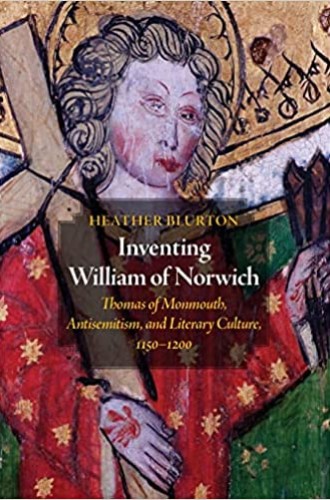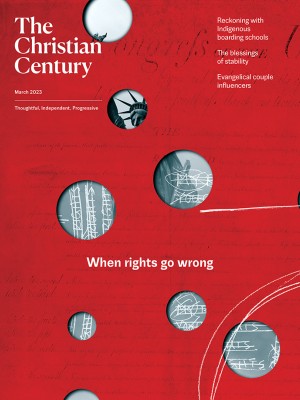From hateful murmurs to blood libel
Heather Blurton explains the origins and legacy of an outrageous antisemitic lie: the fable of William of Norwich.
Many of our foundational theological and liturgical texts are anti-Jewish by design. As St. Augustine wrote in The City of God: “For what is that which is called the Old Testament but the veiled form of the New? And what else is that which is called the New but the unveiling of the Old?” This remains basic teaching today in churches of all kinds. And it’s complicated because, as English and comparative literature scholar Heather Blurton points out in Inventing William of Norwich, “Augustine took his inspiration directly from the words of Christ, who is represented in the Gospels on several occasions as identifying himself as the fulfillment of [Jewish] prophetic traditions.” These ideas are at the heart of supersessionism, a teaching recently repudiated in the magisterium of my own Roman Catholic tradition, albeit still taught from most of our altars and pulpits.
In Blurton’s words, supersessionism presumes that “through Christ’s fulfillment of the prophecies of the Old Testament and his sacrifice on the cross, the truth of the Old Testament is subordinated to the truth of the New, and Christianity supersedes Judaism.” For 2,000 years, supersessionism has been the primary lens for a Christian understanding of Jews and Judaism. Chances are good that your favorite premodern Christian writer was infected.
Read our latest issue or browse back issues.
In the Roman Catholic Church, the 1965 Vatican II document Nostra aetate went a long way toward correcting these mistakes with an understanding that all of the New Testament writers (with the possible exception of Luke) were Jews involved in intra-religious arguments. But even Nostra aetate doesn’t escape supersessionism completely. For instance, when it tries to correctively state, “the Jews should not be presented as rejected or accursed by God, as if this followed from the Holy Scriptures,” that sentence still begins: “Although the Church is the new people of God.”
Blurton’s book, critically important and likely to be read by very few, explains in detail the origins of the most hateful and outrageous of antisemitic lies: the fable of a 12-year-old boy named William whom Catholicism made into a saint because he supposedly performed miracles after dying a martyr’s death in 1144 at the hands of malicious Jews who ritually murdered him as a mockery of the crucifixion of Christ. It is true that young William was murdered, but it was at least six years after his mysterious death that a monk of Norwich Cathedral priory, Thomas of Monmouth, wrote what he called The Life and Passion of William of Norwich, spinning the antisemitic lie to address an unexplained death. This is the origin of the “blood libel” against Jewish people that has haunted the world ever since.
Monmouth tells a story—created out of thin air—of the boy being lured to his death by Jews eager to harm a Christian on what was both Good Friday and the week of Passover. Monmouth tells of the adults torturing the boy in ways meant to replicate the crucifixion of Christ. He coins the terms “bloodthirsty” and “Christ killers” for the Jews. He also gives us a third antisemitic trope—of secretive and antisocial Jews who are ultimately unfaithful to their civic community, since they feel truly bound only to their religion.
Of all the places to find antisemitism, it was from hagiography that it sparked its most dangerous fires. Here we have a monk writing about divinity, miracle, martyrdom—using what another scholar, Jeremy Cohen, calls a “hermeneutical Jew,” present only as a construct of Christian theology. Monmouth’s story “quickly catches on,” as Blurton chronicles the literary history. Think of the antisemitic episodes in Chaucer’s Canterbury Tales, Marlowe’s The Jew of Malta, and Dickens’s Oliver Twist. These and other authors, inspired by the original lie, then took it into other areas—including the secret desecration of eucharistic wafers and the use of Christian blood in making Passover matzos—and into the dramatic arts, such as the medieval Passion plays.
Blurton’s unique contribution to this field of study is to focus on what medieval Christians were reading, which inspired all these antisemitic activities. As she explains, it is often asserted by scholars that a text such as The Life and Passion of William of Norwich was written “not because the monks of Norwich believed that the Jews had kidnapped and ritually murdered a Christian child—but precisely because they did not believe it.” This of course exonerates no one; on the contrary, Monmouth turned hateful murmurs—always present in hearts before someone calls them to life—into hagiographical fantasy. “Straw men,” Blurton calls the Jewish people in Monmouth’s tale. She also indicates, in many and varied ways, how the proposed sanctity of young William is then also like straw.
Just as Cohen, who is quoted effectively several times by Blurton, identifies the trope of the hermeneutical Jew laced throughout the second millennium of Christian theology, one could also speak of a hermeneutical Judaism—a fiction brought into existence simply to strengthen Christian claims and to define what “Christian” means.
Blurton devotes chapters to analyzing the miracles performed by this child-saint, the meaning of redemptive suffering in medieval Christianity, and the power of affective piety to influence Christians in those centuries. These are discussions mostly for scholars, such that the best starting place for readers to learn about Monmouth’s foundational antisemitic account may be the Penguin edition of The Life and Passion of William of Norwich, translated and introduced by Miri Rubin (2014). Still, Blurton’s discussions left me thinking that these same things—a child-saint, redemptive suffering, and appeals to affective piety—might easily be used in our time to justify the hatred and pillorying of a people.
She also looks closely at the relationship between history and fiction in Monmouth’s account and people’s reception of it. When she discusses “a central problematic: the desire to persuade an audience of the truth of something that has not been witnessed,” it again feels frighteningly fresh and familiar. QAnon and many related absurdities have been started with similar problematics and will likely remain similarly entrenched in human minds and souls.





